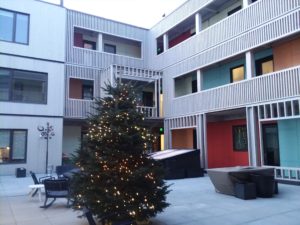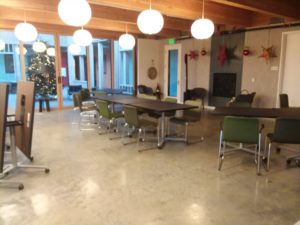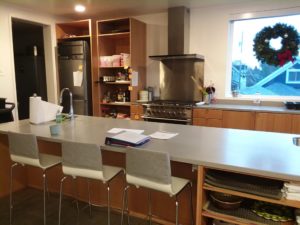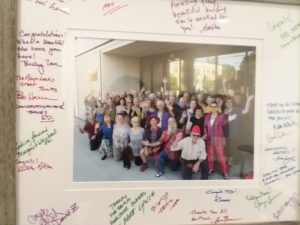 PDX Commons is a community of proactive older adults, located at 4262 SE Belmont Street in Portland, Oregon. The site is walkable to grocery stores, close to transit lines, and near parks and libraries. There are 27 units total, with residents ranging from 55-76 years old.
PDX Commons is a community of proactive older adults, located at 4262 SE Belmont Street in Portland, Oregon. The site is walkable to grocery stores, close to transit lines, and near parks and libraries. There are 27 units total, with residents ranging from 55-76 years old.
Contents
Founding members
Lew Bowers and his wife, Susan, were two of the founding members of PDX Commons. Their adult daughter lives in San Francisco, and they were considering following her to the Bay Area, but real estate was too expensive. The couple resolved to stay in Portland, but not in their old house, which was too big for just the two of them. They began to ask around, searching for others who wanted to pool their resources and co-create an intentional community. They discovered another couple who shared a vision for the type of housing where they’d want to spend the “third chapter”. Future member Jim Swensen agreed to host the first meeting in his living room to develop the vision of what this senior community would look like.
Vision
Bowers and the others agreed that one of the big problems as people age is social isolation. “Having this community was the best antidote we can think of,” Bowers stated. “It’s based on the sharing economy. Everyone doesn’t have to have one of everything.”
Architectural Design
Cohousing is designed architecturally to generate contact and interaction with people in different living areas. Bowers had extensive development experience, as an Urban Development Department manager at the Portland Development Commission. He helped the group come up with a design and plan, along with local architects. PDX Commons is the first senior cohousing community in Portland built as stacked flats instead of freestanding houses. The building and bathrooms are all ADA accessible.
The PDX Commons building is situated around a courtyard, a large dining facility with a commercial kitchen, library, living room, fireplace in the lobby, and media room on the ground floor. There are 25 parking spaces total. Residents have considered a system of car sharing, but have not yet implemented it. There is a guest room and suite for all the residents to share. The suite is set up as a studio apartment, possibly for a medical or nursing student — health-support to address the needs of the senior residents.
All members signed a waiver that they were not looking for assisted-living when moving into PDX Commons, and that they don’t expect PDX commons members to assist them with any developing health problems, but the community still will address the needs of aging residents through their care committee and in generous acts such as driving one another to doctors appointments – generous acts of good neighbors. If and when members’ health problems become severe, they would need a helper to move into their individual unit, or move out. One PDX member mentioned that there is a nursing home down the block, and half-jokingly stated that she wants to establish a relationship with the home so that PDX Commons members could transfer there when needed.
Strategy for attracting new members
A few of the founding members of PDX Commons had been a part of a previous cohousing effort in 2008, which had failed due to the recession. The previous project had attracted many interested parties though it never came to fruition. PDX Commons members scooped up the old list and started calling to see who was interested in starting a new senior cohousing community.
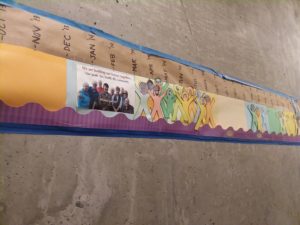
PDX Commons developed a marketing committee and had informal coffee meetings every two weeks for years for new members to drop in and ask their questions. The marketing committee also set up information booths at conferences, and wrote up articles about their proposed community for local newspapers. Member Jim Swensen lent their group his expertise in marketing and the radio, helping to develop catchy ads describing their project for public radio. If an interested party seemed like a good fit, the applicant was encouraged to attend a potluck that took place monthly.
Like many other cohousing projects, PDX Commons asked new members to sign an agreement, clarifying who was ready and willing to commit to the project. After attending at least one potluck, an applicant could become an associate member by paying $250 to the LLC. After 60 days as an associate member, the individual or couple would be able to join as full members, as described below. Interested parties needed to fit certain age requirements, as prescribed by the Housing for Older Persons Act of 1995 (HOPA Act),[1. The HOPA Act creates an exception to Title VIII of the Civil Rights Act of 1968 (Fair Housing Act) in order to allow for senior housing developments. The Fair Housing Act protects all residents from discrimination on the basis of race, color, national origin, religion, sex, handicap or familial status. Senior housing facilities and communities are exempt from liability for familial status discrimination under the HOPA Act, and they can lawfully refuse to sell or rent dwellings based on age.] which dictated that at least 80% of units need to be sold to people over the age of 55, to qualify as senior-housing.
Hiring Consultants
Cohousing expert Kathryn (Katie) McCamant was the first consultant that PDX Commons members hired. Katie had co-written a book with her husband, Charles (Chuck) Durrett, called Cohousing: A Contemporary Approach to Housing Ourselves. Chuck had also written The Senior Cohousing Handbook: A Community Approach to Independent Living. In these books, cohousing gurus McCarmant and Durrett outline the entities that cohousing groups should choose to incorporate, as well as ideal finance and governance models.
Site search
Members visited and considered more than 20 sites before deciding on the Belmont Street location. They lost several members during the process, as real estate prices in the city of Portland were rising, and the prices of real estate and cost of construction proved higher than they had anticipated. Nancy Burgi-Oleson, an active member among the first five families to join, describes the process as “sticker shock”. One challenging time, she says, was during the winter of 2016 when construction kept getting delayed and the cost of completion kept going up. However, the unanticipated construction fees were accounted for within the budget by charging members slightly higher amounts for their unit prices. Therefore, Bowers states that the contingency items never caused the group to surpass their budget.
Financials
In the planning and development stage of PDX Commons, the members formed an LLC, called Portlandia Cohousing, LLC, to receive member fees and loans. They used those funds for legal costs and marketing outreach, to pay the costs of an architect, designer and consultant.
The group chose to incorporate as an LLC to protect individual members’ personal assets in case the cohousing project defaulted. They were following McCamant’s advice, who suggested this entity type for handling the preliminary finances. As McCamant told them, only one-third of all cohousing initiatives were successful, so there was a risk that the money would be lost.
Bowers states that they would have incorporated as a cooperative, but there were few, if any, banking institutions that would provide loans for individuals purchasing shares in a coop. Instead, PDX Commons followed McCamant’s advice to go with a condo model, and still function as a cohousing community in their governance design (consensus-based decision making) and ample common space (about 5,000 square feet of indoor common space, as shown in the pictures).
One of the largest expenses for the LLC in the pre-development phase went towards legal fees, which included a real estate attorney to help close on the property and a securities lawyer who handled the investments or loans that members made. The LLC qualified for a federal exemption under securities law, Regulation D. They did not qualify for the intrastate exemption since a number of their members, approximately 35%, lived out of state, and were only going to move to Portland once the land was found and the cohousing project complete. The LLC had to file with the California Department of Business Oversight for qualification of the securities, since at least one investor resided in California and hadn’t yet moved to Oregon. The LLC did not have to file with Oregon state, since they were exempt under provision ORS 59.035.[2. ORS 59.035 (12)(a), which provides an exemption for registration for the sale of securities to not more than 10 purchasers in any 12 months. This is known as the “10 in 12” exemption. This statute applies when offering investments to non-accredited (but sophisticated) investors. Under this statute there must be: 1) no commission paid and 2) no advertisement to the general public. So long as a party has not solicited the general public, nor paid a commission to a broker, there may arguably be a sale to up to 10 non-accredited investors without having to register under Oregon state securities law.]
Associate members of the LLC paid $250 in the exploration stage to get to know if they were a good fit for the community. After signing a form that they were members, they gave an initial investment as a downpayment to their unit. There were different levels of investors: either $2,500, $5,000 or $7,500. (The amount went up over time, as the likelihood increased that the project would materialize, as it seemed less of a risk that the down payment would be lost.) This down payment was considered an investment in the LLC since there was not yet any property that had been acquired. For the first 10-12 households, there was an incentive that if the project was built, the LLC would double their initial investments as the down payment. The matching funds in the LLC was factored into the unit prices of all members, as was the cost of marketing and legal fees. All of the members of PDX Commons had an equal ownership interest in the LLC, once they paid their $250 member fee – the only form of equity that was paid.
In the development stage, Portlandia Cohousing, LLC, hired Urban Development and Partners (UD+P) to act as a professional fee developer. UD+P secured a bank loan for the entire construction project, after each household put 20% of the price of their unit as a cash down payment. Some members volunteered to invest more funds as a security with modest returns, to make up for the fact that not all the units were filled by that point, and funds were still needed for the down payment of every unit under construction. A securities lawyer came up with the offering statements and documents that described the risk of members in making that down payment investment. The rest of the cost of construction and development was covered by the bank loan made to the LLC, which was procured by, and personally guaranteed by UD+P.
Members of Portlandia Cohousing paid the bank loan back in full upon completion of construction. This way, members avoided the accrual of interest. Most members were able to pay their portion of the loan with the assets obtained by selling their previous homes. Some had to take out a personal mortgage that they used to purchase their condo. The price of units ranged from about $390,000 – $710,000 depending on their size and the number of bedrooms. The smaller units are approximately 650 square feet and the larger ones are about 1250 square feet.
The plan that McCamant set out, which PDX Commons adopted, was that once the project was complete and members moved in, the LLC would evolve to a Homeowners’ Association (HOA). Being a member of the LLC gave each household the right to purchase a unit and thus become a founding member of the HOA. As of October 23, 2017, once members all moved on site and the units were purchased, the Homeowners’ Association was created. The LLC plans to phase out in the near future. The HOA’s bylaws and codes, covenants and restrictions replace all previous agreements. The HOA’s documents meet the standard mortgage requirements of Fannie Mae, Freddie Mac, and the Federal Housing Administration, and Oregon state law.
There are now monthly HOA fees that members have to pay, used for a replacement reserve and operating costs. The monthly costs range from $350 to $550 depending mostly on whether the member owns a one bedroom, two bedroom or three bedroom apartment. The funds are used to maintain common spaces and replacement reserves, as is standard for the maintenance of condos.
Governance and Decision Making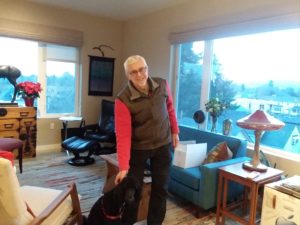
One member from each of the 27 units at PDX Commons is represented on the Board of the HOA. The Board only makes the decisions required by the state of Oregon by law, and the rest have been delegated to the general committee comprised of all 39 residents, every member of the HOA. During periods of construction of the apartment complex, members met about every two weeks, since there were ongoing decisions to be made. Now, members meet on a monthly basis.
PDX Commons uses a consensus model with a voting fall-back. If all committee members agree on a decision, it is passed. If at least 75% of the general committee agree (a super majority), the decision is brought to the board, and if at least 75% of the board agrees, the decision is passed.
Members had a professional facilitator named Tasha Harmon come in and train them on consensus decision-making. McCamant had suggested that it is advisable to hire a consultant to help the group refine its decision making and conflict resolution skills early on, establishing a relationship to make it easier for that person to help the group through rough spots, once those arise. After establishing that initial relationship, Tasha facilitated the meeting when PDX Commons members made the final decision about their project site, deciding among three sites. She then returned to provide additional training in consensus decision making.
In the beginning, most meetings were facilitated by a member of PDX Commons who happened to be a professional facilitator. Now there is a “community process committee” and a “facilitation team” that rotate in facilitation responsibilities.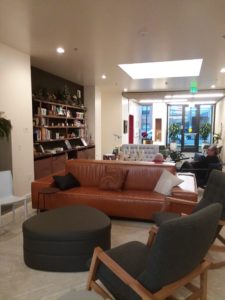
When PDX Commons was still operating as an LLC, before completion of the project, they operated entirely on the consensus model. But now that they are an HOA, there are more state guidelines, requiring by law that the board take on certain responsibilities. The law is more prescriptive for HOAs, but all decisions not prescribed by state law to be made by the Board of Directors are delegated to the community of the whole or individual committees. For example, although law requires the treasurer to sign all financial documents, the decisions are actually made by the finance committee. There are several other committees that comprise the HOA, including the building and grounds committee that handles questions of architecture and gardening, an outreach committee, and the house committee, comprised of “meal teams” and “clean teams”. There is no policing of participation in meetings and committees, but it is a strong expectation that is formalized in the participation agreement that all members sign, and all members seem to be on board with being extremely involved. There is a process for removal of a member if he or she violates the CC&R agreement, for violation of the rental policy, for example, but a member will not be removed if they are unable to participate in the governance process.
When a tenant wishes to sell their apartment, it goes on the open market for whatever resale price the tenant wishes. The HOA reserves the right of first offer, so that it could offer that unit to someone on the waiting list, who has already been vetted by the resale committee. The resale committee interviews potential residents and adds their name to the waiting list if they are determined to be a good fit with PDX Commons, after they have expressed interest and applied.
Future trailblazers of senior cohousing in Oregon
Lew Bowers is completing a year-long fellowship in cohousing creation, sponsored by Katie McCamant called 500 Communities. He is going to partner up with UD+P to help support additional senior cohousing around the state of Oregon. UD+P will act as the fee developer, looking for property and securing the bank loan. Bowers will be in charged of gathering the group of core members or working with existing core groups.
There are already other forming groups of senior cohousing communities, including in Hood River and Eugene, Oregon. Some groups are facing unanticipated challenges, such as neighborhood associations who are objecting to the development of these senior communities, if the cohousing project needs specific variances in zoning law to move forward. PDX Commons did not encounter this challenge – they did not need a variance to go ahead with their project, yet the LLC still brought the project to the network of neighborhood organizations, who didn’t object. The neighborhood welcomed the construction of condos, rather than rentals in their neighborhoods, since it is mostly rentals that are being built around Portland these days.
